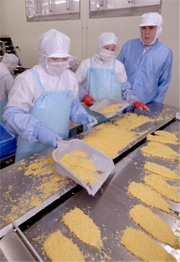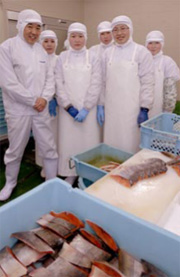Home > Highlighting JAPAN > Highlighting Japan MARCH 2012 > Return of the Chinese Trainees
Highlighting JAPAN
COVER STORY: Rising from Adversity—TOHOKU, ONE YEAR ON
Return of the Chinese Trainees
Many Chinese trainees are learning about Japan's advanced processing technologies in marine product and food processing plants in Iwate Prefecture. Although a majority of the trainees returned to China after the Great East Japan Earthquake, as the reconstruction of the disaster afflicted areas progresses, so they have been returning. Toshio Matsubara reports on the Chinese trainees working hard alongside their Japanese colleagues.

Mikio Morishita (right), president of Morishita Suisan, with Chinese trainees preparing fried fish at the factory of Morishita Suisan
Credit: YOSHIFUSA HASHIZUME
Jing Xiao Mei, the leader of nine trainees who came back to Morishita Suisan last August, said, "My family told me that I should not go back to Japan as it is not yet safe to live there. The families of other trainees said the same thing. But I wanted to work with my Japanese colleagues to help the company recover from the disaster. That is why I came back. People at the plant are kind and I enjoy working there. I am making my best effort to help the company return to the same status as before the earthquake. At present, I am very motivated and looking forward to the future."
Yang Zu Yan and Wang Sheng Jie, who came back to Ono Foods last December expressed the same sentiments. All eleven of the women trainees at Ono Foods are from Shandong Province, China.
All say that one of the main reasons they came back was the family atmosphere the companies have. Mikio Morishita, president of Morishita Suisan, lived in an evacuation center together with the nineteen female trainees after the earthquake, despite the fact that his house was not affected by the disaster. He wanted to support them as much as possible when they were facing an uncertain situation in a foreign land.

Akio Ono (left) and Chinese trainees and Japanese workers cut salmon at the factory of Ono Foods.
Credit: YOSHIFUSA HASHIZUME
Ono said, "Two trainees came back to the company last December. So I immediately went to Shandong Province to convey my gratitude and appreciation. Three trainees who had returned and stayed home since last March also came to see me. I thanked them for their kindness. In return, the staff of a trainee dispatching company and the ex-trainees assured me that they would make the utmost effort to make the families and parents of trainees understand the situation in Japan as soon as possible to allow more trainees to return to Japan."
While repairing and reconstructing plants that were damaged by the disaster, Morishita Suisan and Ono Foods have been steadily gearing up to start new businesses. Morishita Suisan plans to distribute sashimi, or raw fish, in Japan after freezing it. Ono Foods aims to expand its mail-order business of frozen boiled and grilled fish, and start operations in Asia in a few years time. Ono said in his blog that a huge number of e-mails from the users of the mail-order services of his company reached him immediately after the earthquake, expressing their support for his operations. He said that this support made him determined to rebuild the business of his company and served as the main motivation to achieve an early resumption of operations.
Morishita said, "Every member of staff is important. No matter what their nationality, language, or culture, as long as we try to understand each other, we can make it through together. The heart is the most important thing." True to these words, the workplaces of the two companies were full of life and energy as trainees and Japanese staff were working together closely.
© 2009 Cabinet Office, Government of Japan






